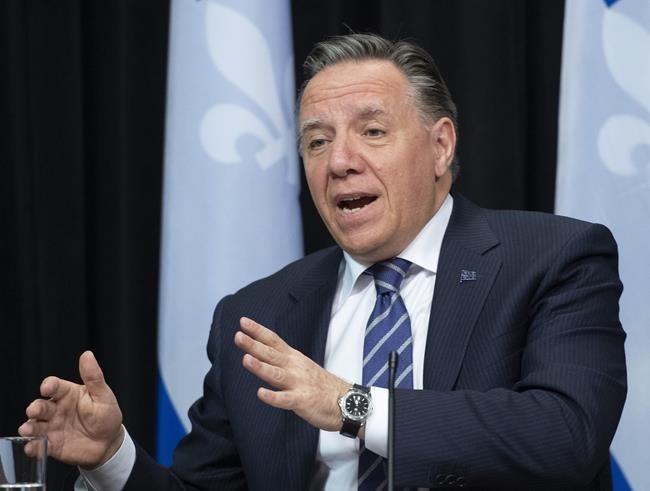OTTAWA — Nearly three decades after the failure of the Charlottetown accord, Quebec's status as a distinct society and hand-wringing over constitutional reform are back on the table.
Quebec rolled out proposed language reforms last week that aim to make unilateral changes to the Canadian Constitution. Known as Bill 96, the legislation seeks to amend the country's supreme law to enshrine Quebec's status as a nation and its official language as French.
An initial Justice Department analysis concluded Quebec can go ahead with the changes, Prime Minister Justin Trudeau told reporters Tuesday.
But experts disagree, saying constitutional tweaks to language use require a parliamentary green light. They also warn against treating the pair of provisions as symbolic baubles on an unchanged Charter of Rights and Freedoms, highlighting potential legal implications from the Constitution on down.
Federal parties that run candidates across the country are handling with care the question of Quebec's language and identity as they look to avoid stirring up anger in the province ahead of a possible election this year, while the Bloc Québécois seizes a chance to shore up francophone protections — and votes.
The Bloc will table a motion in the House next week calling on lawmakers to pledge they'll steer clear of any legal challenges to the provisions and that Quebec does not need House support for them to go through, Leader Yves-François Blanchet said Wednesday.
"I strongly doubt that the present prime minister of Canada was raised being told every day that Quebec is a rightful nation."
Blanchet added that Trudeau likely knows if he does not fall in line with Quebec Premier François Legault's l00-page language overhaul that "he will have a huge price to pay in Quebec."
Constitutional expert Emmett Macfarlane says that at a minimum, Quebec would need to win authorization from the House of Commons and the Senate for the "official language" amendment to pass.
"The proposal cannot be accomplished unilaterally," said Macfarlane, an associate professor at the University of Waterloo.
Section 43 of the Constitution states that an amendment for "any provision that relates to the use of the English or the French language within a province" must be authorized by the Senate, the House and the legislature of the province to which it applies.
The assertion of Quebec as a nation has an even higher threshold for inscription in the Constitution, said Michael Feder, a Vancouver-based lawyer with expertise in constitutional law.
Legault's argument in favour of a unilateral edit relies largely on Section 45, which states that each provincial legislature "may exclusively make laws amending the constitution of the province."
But Feder and other critics say defining a province as a nation could have knock-on effects across the country, not just in Quebec, with the potential to rejig the structure of the federation rather than just pin on a constitutional accessory.
"I have some difficulty understanding what that means and why it’s being inserted into the Constitution if not to affect other provinces, and for that matter the federal government," Feder said.
For changes relevant to the federation as a whole, he said the standard amending formula would apply: requisite approval from the House, Senate and seven or more provinces comprising at least 50 per cent of the population.
The ramifications of the two provisions are hard to gauge, but could open the door to greater provincial power for Quebec or the exclusive use of French in its legislature, among other changes, Feder added.
"It’s sort of a bedrock principle of constitutional interpretation that provisions are read in light of one another. So once it’s in, if you’ve got a provision saying Quebecers form a nation, it has to be given meaning. You can’t just say it’s mere symbolism and we’ll do what we always did."
In 1993, a subsection was added to the Charter after the House and Senate teamed up with the New Brunswick legislature to adopt resolutions recognizing the province as officially bilingual. The amendment was "bilateral," notes a 2018 report from New Brunswick's official languages commissioner, rather than unilateral.
"If New Brunswick decided to do exactly the same thing (as Quebec currently) — or conversely decided to make English its only official language — it too could do that unilaterally. And that strikes me as untenable," Feder said.
David Taylor, a spokesman for federal Justice Minister David Lametti, said minority language rights would remain secure in Quebec regardless of the new amendment, citing Section 133 of the Constitution. It guarantees that either language can be used in courts and legislative debates in Quebec.
“It’s the interplay between those two pieces that Quebec continues to respect its obligations under Section 133," he said.
Meanwhile, angst is growing behind the scenes among some Quebec Liberals, who occupy 35 of the province's 78 seats in the Commons.
"I think it needs clarity. I think what Trudeau said was maybe interpreted not as what it was meant to be, and not as clear," said Mitchell Brownstein, chair of the Liberal riding association for Mount Royal on the Island of Montreal and mayor of Côte Saint-Luc.
"Any debate on language is not a good thing, as right now we have relative peace with respect to the issue of language in Quebec. And we’d like it to stay that way and not create another exodus of young people who have concerns.”
Macfarlane said he would have no issue with any province declaring itself a distinct society so long as the Constitution doesn't come into play.
"But just throwing up our hands because the political incentives are to accommodate Quebec is not healthy for democracy and the rule of law," he said.
This report by The Canadian Press was first published May 19, 2021.
Christopher Reynolds, The Canadian Press



